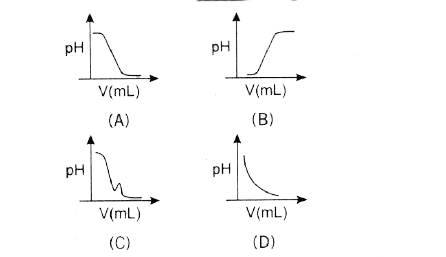Which of the following do not show change in pH on dilution?
0.1 M NaCI
0.1MCH3COONH4
0.1MNaHSO3
NaH2PO2
The correct Answer is:A, B, C
To determine which of the following solutions do not show a change in pH upon dilution, we need to analyze each option based on the properties of acids, bases, and salts.
1. Understanding pH and Dilution:
- pH is a measure of the acidity or basicity of a solution.
- When a solution is diluted, the concentration of the solute decreases, which can affect the pH depending on the nature of the solute.
2. Identify the Options:
- The options given are:
- A) 0.1 mNCl (Sodium Chloride)
- B) 0.1 mCH3COOH (Acetic Acid)
- C) 0.1 mNH3 (Ammonia)
- D) NH2PO2 (Sodium Hypophosphite)
3. Analyzing Each Option:
- A) 0.1 mNCl:
- Sodium Chloride (NaCl) is a salt formed from a strong acid (HCl) and a strong base (NaOH).
- Salts of strong acids and strong bases do not change pH upon dilution.
- Conclusion: No change in pH.
- B) 0.1 mCH3COOH:
- Acetic Acid (CH3COOH) is a weak acid.
- Weak acids can change their pH upon dilution because they do not completely dissociate in solution.
- Conclusion: Change in pH.
- C) 0.1 mNH3:
- Ammonia (NH3) is a weak base.
- Weak bases can also change their pH upon dilution due to incomplete dissociation.
- Conclusion: Change in pH.
- D) NH2PO2:
- Sodium Hypophosphite is a salt formed from a weak acid (H2PO2) and a strong base (NaOH).
- Salts formed from weak acids and strong bases can change pH upon dilution.
- Conclusion: Change in pH.
4. Final Evaluation:
- From the analysis, only 0.1 mNCl (Sodium Chloride) does not show a change in pH upon dilution.
- The other options (0.1 mCH3COOH, 0.1 mNH3, and NH2PO2) will show a change in pH upon dilution.
Final Answer:
The solution that does not show a change in pH on dilution is 0.1 mNCl (Sodium Chloride).
- pH is a measure of the acidity or basicity of a solution.
- When a solution is diluted, the concentration of the solute decreases, which can affect the pH depending on the nature of the solute.
- The options given are:
- A) 0.1 mNCl (Sodium Chloride)
- B) 0.1 mCH3COOH (Acetic Acid)
- C) 0.1 mNH3 (Ammonia)
- D) NH2PO2 (Sodium Hypophosphite)
- A) 0.1 mNCl:
- Sodium Chloride (NaCl) is a salt formed from a strong acid (HCl) and a strong base (NaOH).
- Salts of strong acids and strong bases do not change pH upon dilution.
- Conclusion: No change in pH.
- Acetic Acid (CH3COOH) is a weak acid.
- Weak acids can change their pH upon dilution because they do not completely dissociate in solution.
- Conclusion: Change in pH.
- Ammonia (NH3) is a weak base.
- Weak bases can also change their pH upon dilution due to incomplete dissociation.
- Conclusion: Change in pH.
- Sodium Hypophosphite is a salt formed from a weak acid (H2PO2) and a strong base (NaOH).
- Salts formed from weak acids and strong bases can change pH upon dilution.
- Conclusion: Change in pH.
- From the analysis, only 0.1 mNCl (Sodium Chloride) does not show a change in pH upon dilution.
- The other options (0.1 mCH3COOH, 0.1 mNH3, and NH2PO2) will show a change in pH upon dilution.
The solution that does not show a change in pH on dilution is 0.1 mNCl (Sodium Chloride).
Similar Questions
Knowledge Check
In an acid- base titration, 0.1 M HCl solution was added to the NaOH solution of unknown strength . Which of the following corretly shows the change of pH of the titration mixture in this experiment?
 A( C )B(B)C(A)D(D)
A( C )B(B)C(A)D(D)
Which of the following laws do not show any deviation ?
View SolutionIn an acid base titration, 0.1 M HCI solution was added to the NaOH solution of unknown strength. Which of the following correctly shows the change of pH of the titration mixture in this experiment?

View SolutionIn an acid base titration, 0.1 M HCI solution was added to the NaOH solution of unknown strength. Which of the following correctly shows the change of pH of the titration mixture in this experiment?

View SolutionWhich of the following do not show Kranz anatomy in their leaves ?
View SolutionWhich of the following salts will not change the pH of pure water on dissociation?
View SolutionWhich of the following do not change the value of K for a reaction?
View SolutionWhich of the following cells do not show DNA duplication or RNA sythesis ?
View Solution

